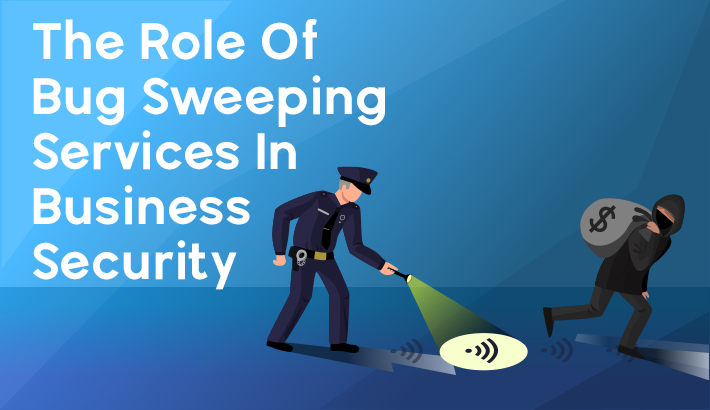In today’s digital age, businesses face an ever-increasing array of security threats, both online and offline. Among these threats, electronic surveillance and eavesdropping have become a significant concern for organizations seeking to protect their sensitive information, trade secrets, and communication channels. Bug sweeping services play a pivotal role in enhancing business security by detecting and eliminating hidden electronic surveillance devices, commonly referred to as bugs, from offices, conference rooms, boardrooms, and other sensitive areas.
This article explores the importance of bug sweeping services in safeguarding businesses from potential espionage and information leaks.
Understanding the Threat Landscape
Corporate espionage and unauthorized information gathering are serious issues that can adversely affect a company’s reputation, financial stability, and competitive advantage. Sophisticated eavesdropping technologies, such as hidden cameras, audio recording devices, and GPS trackers, pose a constant threat to businesses, as they allow malicious actors to gain unauthorized access to sensitive information and conversations.
The Evolution of Bug Sweeping Services
Bug sweeping services have evolved significantly over the years, keeping pace with advancements in surveillance technology. Today, professional bug sweepers employ cutting-edge equipment and expertise to detect even the most sophisticated hidden devices. These services offer a proactive approach to security, helping businesses stay one step ahead of potential threats.
Benefits of Bug Sweeping Services for Businesses
- Identifying Hidden Threats: Bug sweeping services utilize specialized equipment, such as radio frequency (RF) detectors, thermal imagers, and non-linear junction detectors, to identify concealed surveillance devices. These professionals thoroughly inspect the premises, from walls and ceilings to furniture and electronic equipment, leaving no potential hiding spots unchecked.
- Safeguarding Confidentiality: For businesses dealing with sensitive data, intellectual property, or confidential conversations, bug sweeping services are essential. By ensuring that no unauthorized listening or viewing devices are present, these services protect the integrity of private information and internal discussions.
- Maintaining Business Reputation: A security breach or data leak can severely damage a company’s reputation, leading to a loss of customer trust and loyalty. Bug sweeping services help prevent such incidents, safeguarding the company’s image and brand value.
- Legal Compliance: In many jurisdictions, unauthorized electronic surveillance is illegal and can lead to severe legal consequences for the offender. Utilizing bug sweeping services ensures that businesses are not unknowingly violating any laws regarding privacy and surveillance.
- Preventing Competitive Intelligence Gathering: Businesses operating in highly competitive industries often face the risk of rivals attempting to gather sensitive information to gain an advantage. Bug sweeping services help mitigate this risk, safeguarding a company’s valuable knowledge and strategic plans.
- Enhancing Cybersecurity: Bug sweeping services also play a role in bolstering overall cybersecurity. By identifying potential physical breaches, businesses can strengthen their overall security protocols, preventing unauthorized access to digital systems and sensitive information.
The Bug Sweeping Process
The bug sweeping process involves a series of meticulous steps to detect and eliminate electronic surveillance devices effectively. Here’s an overview of the typical bug sweeping procedure:
- Consultation and Risk Assessment: Bug sweeping services begin with a consultation, where the client outlines their security concerns and requirements. The bug sweep team then conducts a risk assessment to identify vulnerable areas and determine the scope of the sweeping operation.
- Physical Inspection: Bug sweepers physically inspect the premises to identify potential hiding spots for surveillance devices. This includes examining walls, furniture, electronic devices, and any other areas where bugs could be concealed.
- Electronic Sweeping: Using sophisticated RF detectors and other specialized equipment, the bug sweepers scan the area for radio signals emitted by hidden devices. They also employ thermal imagers and non-linear junction detectors to identify electronic components that might indicate the presence of a bug.
- Analysis and Identification: Upon detecting any suspicious signals or electronic components, bug sweepers analyze the data to determine if a bug is present. They also assess the nature and sophistication of the surveillance device to better understand the threat.
- Bug Removal and Mitigation: If bugs are found, bug sweeping services will work with the client to eliminate the devices discreetly and efficiently. Additionally, they may provide guidance on how to prevent future breaches and enhance security measures.
Conclusion
In conclusion, bug sweeping services play a critical role in safeguarding businesses from the ever-present threat of electronic surveillance and espionage. By employing advanced detection techniques and equipment, these services identify hidden bugs that could compromise confidentiality and undermine a company’s security. The proactive approach offered by bug sweeping services in Delhi enables businesses to maintain their reputation, protect their valuable information, and stay ahead in an increasingly competitive and vulnerable world. As businesses continue to prioritize security, bug sweeping services will remain an indispensable aspect of their overall security strategy.


